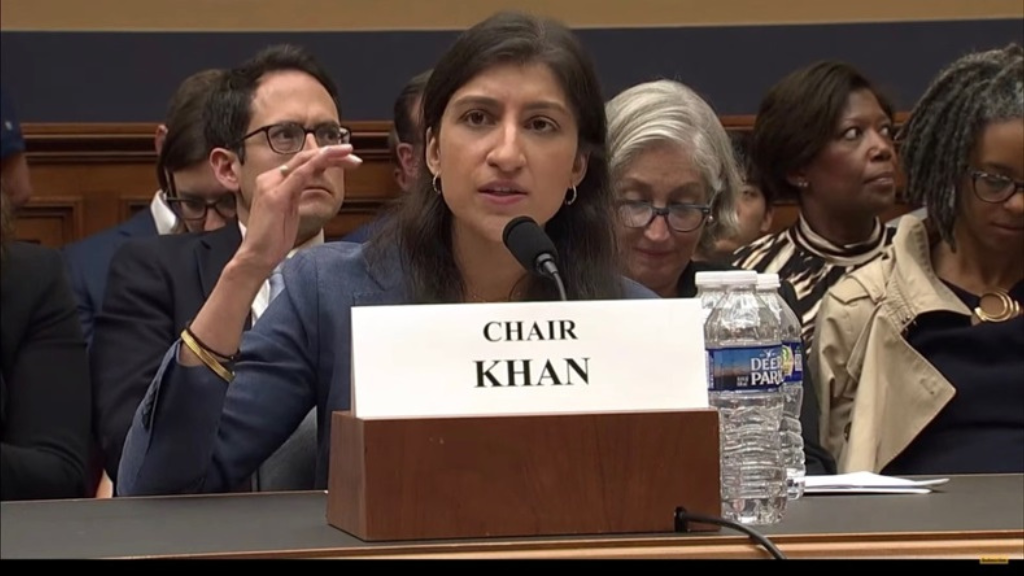OpenAI Under FTC Scrutiny: ChatGPT's Future Uncertain

Table of Contents
The FTC's Investigation: What are the Concerns?
The FTC's investigation into OpenAI is multifaceted, focusing on several key areas crucial for responsible AI development. Their concerns extend beyond ChatGPT's immediate functionality, encompassing the broader implications of powerful AI models and their impact on society.
Data Privacy and Security
The FTC is likely investigating OpenAI's data handling practices, focusing intensely on the collection, use, and protection of user data fed into ChatGPT. This is a significant concern given the vast amounts of personal information processed by the model.
- Concerns about compliance with data privacy regulations: OpenAI needs to demonstrate full compliance with regulations like COPPA (Children's Online Privacy Protection Act) and GDPR (General Data Protection Regulation), particularly concerning the handling of children's data and the rights of individuals in the European Union.
- Potential vulnerabilities leading to data breaches: The sheer volume of data handled by ChatGPT presents a significant target for cyberattacks. Robust security measures are essential to prevent data breaches and protect user privacy.
- Lack of transparency in data usage: Users need clear and comprehensive information about how their data is collected, used, and protected. OpenAI's data usage policies must be transparent and easily understandable.
For example, the use of personal data for training the model raises concerns about potential re-identification of individuals, a risk that requires stringent mitigation strategies. The FTC will likely scrutinize OpenAI's methods for anonymizing and securing this data.
Algorithmic Bias and Fairness
Another critical area of the FTC's investigation is the potential for algorithmic bias embedded within ChatGPT's algorithms. These biases can lead to discriminatory outcomes, perpetuating existing societal inequalities.
- Examples of bias in AI models: AI models, trained on biased data, can reflect and amplify existing societal biases, potentially leading to unfair or discriminatory outcomes in various applications.
- The challenges in mitigating bias: Identifying and mitigating bias in AI models is a complex and ongoing challenge requiring careful data curation, algorithm design, and ongoing monitoring.
- The potential for harm caused by biased AI: Biased AI systems can have significant negative impacts, from unfair loan applications to biased hiring practices. Addressing these biases is crucial for ethical AI development.
For instance, if ChatGPT is trained predominantly on data reflecting certain cultural or demographic biases, its responses might inadvertently reflect and reinforce those biases, potentially harming marginalized communities.
Misinformation and the Spread of Falsehoods
The potential for ChatGPT to generate misinformation and even deepfakes is a significant concern for regulators like the FTC. The rapid spread of AI-generated falsehoods can have serious consequences.
- Examples of AI-generated misinformation: AI models can be used to create convincing but false information, ranging from fabricated news articles to realistic deepfake videos.
- Challenges in detecting and combating AI-generated falsehoods: Detecting AI-generated misinformation can be difficult, requiring advanced techniques and collaborations between researchers, platforms, and policymakers.
- The potential impact on society: The spread of misinformation can undermine trust in institutions, influence elections, and incite violence. Combating this threat is crucial for maintaining societal stability.
The ability of ChatGPT to generate human-quality text makes it a potent tool for creating convincing but false narratives, posing a significant challenge to information integrity and requiring proactive measures to mitigate this risk.
Potential Impacts on ChatGPT and the Future of AI Development
The FTC's investigation will have far-reaching consequences for ChatGPT and the broader AI landscape. The outcome will shape the regulatory environment and influence future AI development.
Regulatory Changes and Compliance
The FTC investigation could lead to significant regulatory changes affecting how AI models like ChatGPT are developed and deployed. This may involve new compliance requirements and increased scrutiny.
- Potential new regulations on data privacy: Expect stricter regulations governing data collection, storage, and use by AI systems, potentially including harsher penalties for non-compliance.
- Stricter requirements for algorithmic transparency: Regulators may demand greater transparency in the algorithms used by AI models, allowing for better understanding and scrutiny of their decision-making processes.
- Increased liability for AI-related harms: Companies developing and deploying AI systems may face increased liability for harms caused by their products, incentivizing greater caution and responsibility.
The costs associated with complying with these potential new regulations could significantly impact the AI industry's operational costs and development timelines.
Innovation and Investment
Increased regulatory uncertainty could stifle innovation and investment in the AI sector. Companies might hesitate to invest in risky AI projects if the regulatory landscape is unclear or overly restrictive.
- The potential for reduced funding: Uncertainty surrounding the regulatory environment could discourage investors from funding AI research and development.
- Slower development of new AI technologies: Increased regulatory burdens could slow down the pace of AI innovation, delaying the development and deployment of beneficial AI applications.
- A shift in AI development focus: Companies might shift their focus away from potentially controversial AI applications to areas with less regulatory scrutiny.
A balanced approach is needed – regulation that protects consumers without stifling innovation and progress.
Consumer Trust and Public Perception
The FTC investigation and its outcome will significantly shape public perception and consumer trust in AI technologies. Building and maintaining trust is paramount for the long-term success of AI.
- The importance of building trust in AI: Public trust is essential for the widespread adoption and acceptance of AI technologies.
- The need for transparency and accountability: Transparency in AI development and deployment is key to building public trust. Accountability for AI-related harms is also crucial.
- The impact of negative publicity on consumer adoption: Negative publicity surrounding AI can damage consumer trust and hinder the adoption of AI-powered products and services.
OpenAI and other AI developers must prioritize transparency, ethical considerations, and demonstrable commitment to responsible AI development to rebuild and maintain public trust.
Conclusion
The FTC's scrutiny of OpenAI and ChatGPT represents a critical moment for the future of artificial intelligence. The outcome of this investigation will significantly influence the development and deployment of ChatGPT and the regulatory landscape for AI as a whole. Addressing concerns regarding data privacy, algorithmic bias, and the spread of misinformation is essential for ensuring the responsible and ethical development of AI. Staying informed about the ongoing developments in the OpenAI/FTC case is crucial for everyone involved in, or impacted by, the rapidly evolving world of artificial intelligence. Understanding the implications of this regulatory scrutiny will be key to navigating the future of AI and shaping a more responsible and trustworthy technological landscape. The future of AI depends on addressing these crucial concerns proactively and transparently. Understanding the potential ramifications of the OpenAI/FTC case is therefore critical for responsible AI development.

Featured Posts
-
 Gucci Supply Chain Officer Massimo Vians Departure
May 25, 2025
Gucci Supply Chain Officer Massimo Vians Departure
May 25, 2025 -
 Escape To The Country What To Expect When You Arrive
May 25, 2025
Escape To The Country What To Expect When You Arrive
May 25, 2025 -
 Rebuilding Bridges Bangladeshs Renewed Focus On European Markets
May 25, 2025
Rebuilding Bridges Bangladeshs Renewed Focus On European Markets
May 25, 2025 -
 Deciphering The Hells Angels An Examination Of Their Culture And Practices
May 25, 2025
Deciphering The Hells Angels An Examination Of Their Culture And Practices
May 25, 2025 -
 Tout Le Monde En Parle Les Revelations De Thierry Ardisson Sur Une Epoque Controversee
May 25, 2025
Tout Le Monde En Parle Les Revelations De Thierry Ardisson Sur Une Epoque Controversee
May 25, 2025
